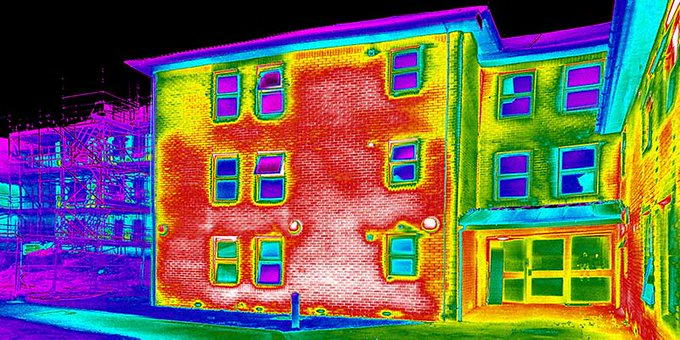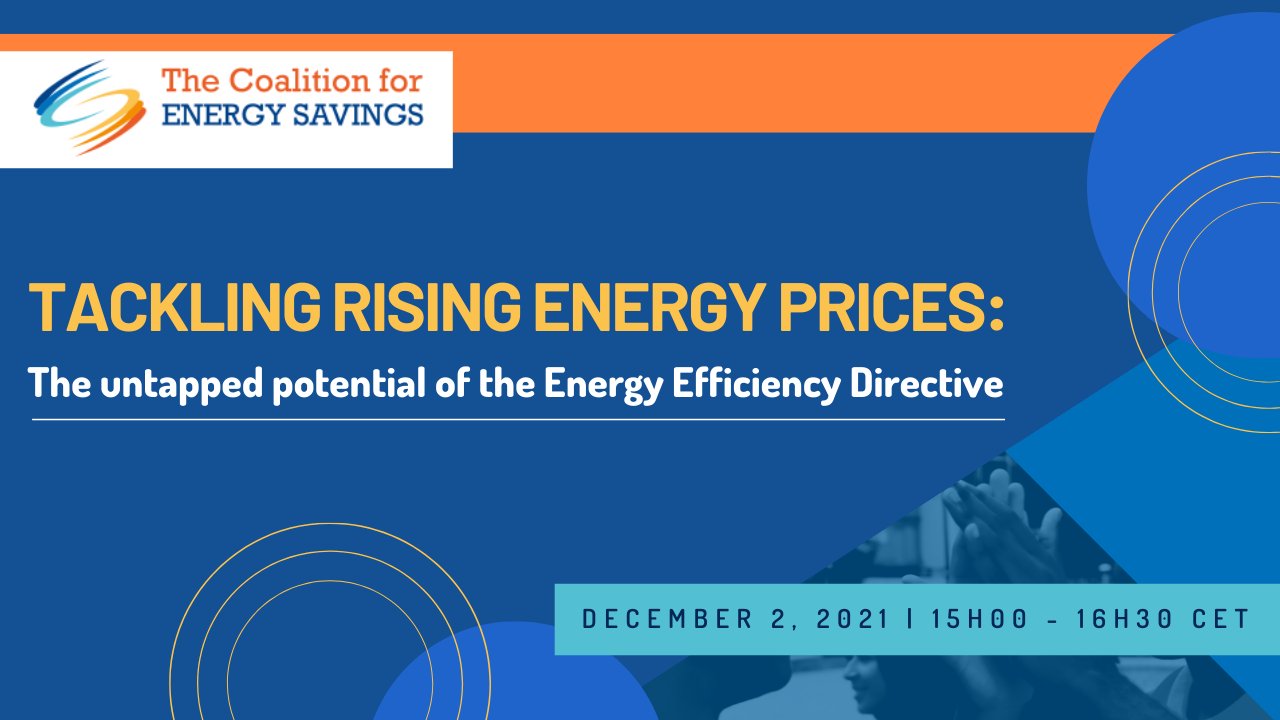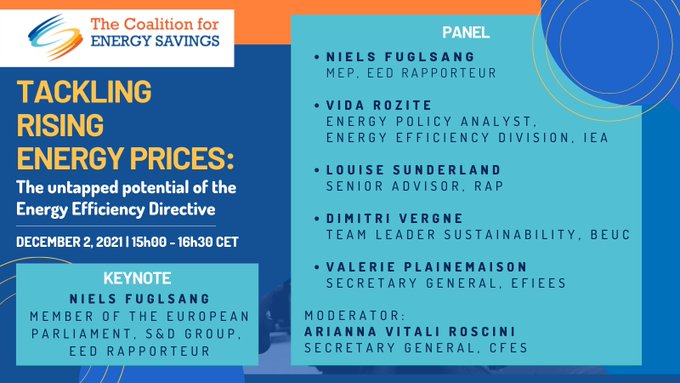
Ενεργειακή αποτελεσματικότητα, η απάντηση στην άνοδο των ενεργειακών τιμών
Σε μια εποχή υψηλών τιμών ενέργειας, η δυνατότητα ενεργειακής απόδοσης στη μείωση των λογαριασμών των νοικοκυριών και στην αύξηση της ενεργειακής ασφάλειας της ΕΕ παραμένει αναξιοποίητη.
Η αναθεώρηση της Οδηγίας για την Ενεργειακή Απόδοση (EED) αντιπροσωπεύει μια μοναδική ευκαιρία για αύξηση της εξοικονόμησης ενέργειας στην Ευρώπη. Μπορεί να προσφέρει μια διαρθρωτική απάντηση στις υψηλές τιμές ενέργειας, ενώ προσφέρει οφέλη για την κοινωνία στο σύνολό της, όπως περισσότερες τοπικές θέσεις εργασίας, καλύτερη υγεία και βελτιωμένη ποιότητα του αέρα. Ταυτόχρονα, η μείωση της κατανάλωσης ενέργειας είναι απαραίτητη για την επίτευξη του κλιματικού στόχου της Ευρώπης για το 2030 και του στόχου της ΕΕ για την κλιματική ουδετερότητα.
Καθώς το Ευρωπαϊκό Κοινοβούλιο και το Συμβούλιο της Ευρωπαϊκής Ένωσης αρχίζουν να διαμορφώνουν τις θέσεις τους σχετικά με την αναδιατύπωση της EED, στην εκδήλωση που οργανώνει η Coalition for Energy Savings θα συζητηθεί το πώς μπορεί να ενισχυθεί η πρόταση της Ευρωπαϊκής Επιτροπής για την επίτευξη των στόχων της ΕΕ για το κλίμα και την ενέργεια με τρόπο προσιτό για τους πολίτες.
Πρόγραμμα:
15:00 – Καλωσόρισμα και Έναρξη
• Arianna Vitali Roscini – Γενική Γραμματέας, Coalition for Energy Savings.
15:05 – Διεύθυνση βασικής σημείωσης – Η αναδιατύπωση του EED: Στήσιμο της σκηνής
• Niels Fuglsang – Μέλος του Ευρωπαϊκού Κοινοβουλίου, ομάδα S&D, εισηγητής EED.
15:25 – Συζήτηση σε πάνελ και Q&A
• Niels Fuglsang – Μέλος του Ευρωπαϊκού Κοινοβουλίου, ομάδα S&D, εισηγητής EED.
• Vida Rozite – Αναλυτής Ενεργειακής Πολιτικής, Τμήμα Ενεργειακής Απόδοσης στον Διεθνή Οργανισμό Ενέργειας (IEA).
• Louise Sunderland – Senior Advisor στο Regulatory Assistance Project (RAP).
• Dimitri Vergne – Team Leader Sustainability & Acting team Leader Energy στην Ευρωπαϊκή Οργάνωση Καταναλωτή (BEUC).
• Valérie Plainemaison – Γενικός Γραμματέας, European Federation of Intelligent Energy Efficiency Services (EFIEES).
16:25 – Τελικές παρατηρήσεις
• Arianna Vitali Roscini – Γενική Γραμματέας, Coalition for Energy Savings

Πώς να δημιουργήσετε και να διαχειριστείτε ένα Ταμείο για ενεργειακή αποτελεσματικότητα
Σύμφωνα με την Οδηγία για την Ενεργειακή Απόδοση (2012/27/ΕΕ, 2018/2002), όλες οι χώρες της ΕΕ υποχρεούνται να χρησιμοποιούν την ενέργεια πιο αποτελεσματικά σε όλα τα στάδια της ενεργειακής αλυσίδας, συμπεριλαμβανομένης της παραγωγής, της μεταφοράς, της διανομής και της τελικής χρήσης ενέργειας. Στόχος είναι η ΕΕ να επιτύχει τον στόχο της ενεργειακής απόδοσης 32,5% έως το 2030 .
Το άρθρο 7 της Οδηγίας για την Ενεργειακή Απόδοση (EED) είναι ένα από τα πιο σημαντικά μέσα για την επίτευξη των φιλόδοξων ευρωπαϊκών στόχων ενεργειακής απόδοσης. Το άρθρο 7 επιτρέπει τη χρήση Ταμείου Ενεργειακής Απόδοσης που μπορεί να λάβει ποσά από πληρωμές υπόχρεων μερών (ή συμμετεχόντων στην αγορά) και από τον δημόσιο προϋπολογισμό για τη χρηματοδότηση δράσεων ενεργειακής απόδοσης για τη δημιουργία απαιτούμενης εξοικονόμησης ενέργειας.
Η παροχή χρηματοδότησης και κόστους-αποτελεσματικότητας βάσει σχεδιασμού είναι το κλειδί για την οικονομική βιωσιμότητα των πολιτικών του Art. 7. Οι πιο κοινές πηγές χρηματοδότησης για το Art. 7 της Οδηγίας Ενεργειακής Αποτελεσματικότητας (EED) είναι ο δημόσιος προϋπολογισμός, η χρηματοδότηση της ΕΕ, οι περιβαλλοντικοί ή ενεργειακοί φόροι, τα κονδύλια του Συστήματος Εμπορίας Ρύπων (ETS – ΣΕΔΕ) και η χρηματοδότηση με βάση τη χρέωση.

———————————————————————————————————————————————————————————————————–
Energy Efficiency is the structural answer to high energy prices
Energy Efficiency is the structural answer to high energy prices. By saving energy, we can tackle energy poverty, increase #renewables and improve living conditions for all Europeans.
At a time of high energy prices, the potential of energy efficiency in reducing household bills and increasing the EU’s energy security remains untapped.
The recast of the Energy Efficiency Directive (EED) represents a unique opportunity to increase energy savings in Europe. It can provide a structural answer to high energy prices while delivering benefits for society as a whole, such as more local jobs, better health, and improved air quality. Simultaneously, cutting energy consumption is indispensable for achieving Europe’s 2030 climate goal and the EU climate neutrality objective.
As the European Parliament and the Council of the European Union are starting to adopt their positions on the EED recast, the event “Tackling risisng energy prices- the untapped potential of the Energy Efficiency Directive” hosted by The Coalition for Energy Saving will discuss how to strengthen the European Commission’s proposal to achieve the EU’s climate and energy targets in a way that is affordable for citizens.

Programme:
15h00 – Welcome and Opening
• Arianna Vitali Roscini – Secretary General, Coalition for Energy Savings.
15h05 – Key note address – The recast of the EED: Setting the scene
• Niels Fuglsang – Member of the European Parliament, S&D group, EED rapporteur.
15h25 – Panel discussion and Q&A
• Niels Fuglsang – Member of the European Parliament, S&D group, EED rapporteur.
• Vida Rozite – Energy Policy Analyst, Energy Efficiency Division at the International Energy Agency (IEA).
• Louise Sunderland – Senior Advisor at the Regulatory Assistance Project (RAP).
• Dimitri Vergne – Team Leader Sustainability & Acting team Leader Energy at the European Consumer Organisation (BEUC).
• Valérie Plainemaison – Secretary General, European Federation of Intelligent Energy Efficiency Services (EFIEES).
16h25 – Closing remarks
• Arianna Vitali Roscini – Secretary General, Coalition for Energy Savings
How to set up and manage an energy efficiency fund
Under the Energy Efficiency Directive (2012/27/EU, 2018/2002), all EU countries are required to use energy more efficiently at all stages of the energy chain, including energy generation, transmission, distribution and end-use consumption. The goal is EU reaching its 32.5% energy efficiency target by 2030.
Article 7 of the Energy Efficiency Directive (EED) is one of the most important instruments for achieving the ambitious European energy efficiency targets. Art 7 allows the use of an Energy Efficiency Fund which can receive amounts from payments of obligated parties (or market participants) and the public budget to finance energy efficiency actions to generate required energy savings.
Providing financing and cost effectiveness by design are key to the financial sustainability of Art. 7 policies. The most common funding sources for Art. 7 EED policies are public budget, EU funding, environmental or energy taxes, ETS funds and on-bill financing.

How to set up and manage an energy efficiency fund
To find out more about how to set up and manage such funds you can join the ENSMOV workshop on 7th December 2021 to learn more about building and managing such a fund, with examples and best practices from countries that have a functioning fund or are developing one. Participants will have the opportunity to actively discuss with speakers and ask questions during this event. You can register here: https://lnkd.in/dE43Wxvc
AGENDA
- 13:00- 13:15 Introduction to ENSMOV and the overview of the topic: funding of energy efficiency – IEECP (Ivana Rogulj)
- 13:15- 14:05 Presentations of the existing funds – Croatia: EIHP (Vesna Bukarica), Spain: IDEA (Diana López Gárcia), Italy: FIRE (Dario di Santo)
- 14:05 – 14: 25 Steps for establishment of the fund – case of Romania – Ministry of Energy (Emilian Stoica)
- 14:25 Q&A and Conclusions – IEECP
ABOUT ENSMOV
The project ENSMOV comes in to offer a platform where knowledge is transferred at EU and national levels with information to public authorities and other key stakeholders to support the implementation of energy efficiency policies.

Αφήστε μια απάντηση